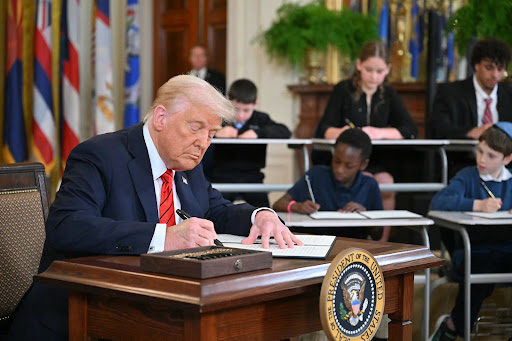On February 3rd, Brooklyn Tech Principal David Newman announced that, starting in the fall of 2025, students would be limited to three advanced placement (AP) courses each year. This policy, which was met with backlash by polled students, will not affect current juniors, according to Newman.
“They’ve had a certain plan…as upperclassmen for how they’re going to play things out,” he stated. “So we talked about that and it sort of made sense [to exclude them].” Going forward, however, the limit will apply to everyone.
Newman instituted this policy for two reasons. “[With] some kids getting locked out of APs and then, more so, the academic and mental health struggles with taking on too [many], a bunch of students…get jammed out of APs,” he explained, observing that students who take more than three APs can crowd class rosters.
Students who load up on a stressful number of APs often do so to gain an edge on college applications, but according to Newman, this strategy may be misguided.
“I’m hoping the kids are less stressed out and more focused on what they should be, not with this false notion that the more AP courses I take, the better chance I have to get into certain universities, which is just simply on some level, not true,” Newman said.
To accompany the limit on AP enrollments, Tech will note in college portfolios sent by counselors that the limit exists, ideally taking the pressure off of students who might otherwise feel compelled to take more than three AP classes to appeal to colleges. In Newman’s experience, students who take too many classes often have “struggles with workload that turn into struggles with mental health.”
Beyond relieving students’ stress, he predicts this policy will create more equal access for all students who apply for seats in AP classes than the current system.
“We’ll give more opportunities for students who historically didn’t get any,” claimed Newman, who also expressed plans to add more spots in the most popular AP classes, to ensure seats are available to all students who want them.
Some students have expressed apprehension and anxiety about the limit.
Sasha Byk (‘27) feels that students should be in control of the number of APs they take, and that they are well aware of the workload that accompanies them.
“You choose to take that many APs, you know what you’re signing up for,” she said. “Some kids…thrive under that [pressure].”
Still, others are glad to see this policy in place, with some wishing it had been implemented earlier.
“I wish that this happened in a previous year so I didn’t have to see all the negative effects firsthand,” stated Finance major Ezra Josse (‘26).
According to Gavin Buckely (‘27), “The limit is a good thing because if there is more than a certain amount [of AP classes allowed], then some kids might be too stressed or feel too…overwhelmed, causing them to do worse in their classes.”
Along with this new AP policy, students will now be required to have a lunch period, eliminating the previous process whereby students could apply, with parental permission, to have it dropped.
“Lunch is important,” Newman emphasized. “It’s important to have a break during the day for mental health…I can’t imagine what it’s like to go full steam ahead from eight o’clock in the morning to 3:35 in the afternoon without eating. That’s insane.”
Students have often dropped their lunch in order to make room for additional classes.
Regarding the mandatory lunch period, Buckley believes it could be a good thing, allowing “kids [to] have a designated time to study or just to eat…It’s a good break time.”
The new policy, though initially unpopular with a majority of students polled by The Survey in school and via Instagram, could perhaps finally break Tech students’ often feverish obsession with maximizing AP classes on their programs.








































